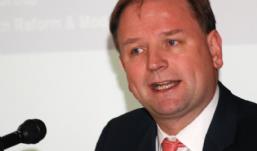The merger or closure of small hospitals might not be the best way forward for an already “centralised” English NHS, Simon Stevens has told the Commons health committee.
The NHS England chief executive’s comments mark a significant change in direction from his predecessor Sir David Nicholson, who favoured centralising most specialist services into 15-30 centres.
The change of approach could have wide-ranging implications for NHS England’s future strategy.
In his first appearance at the committee in his new role, Mr Stevens said that while some cases for centralisation were “unarguable” – such as stroke services – he did not think such an approach was always necessary.
- Stevens: Many believe NHS funding will grow with economy
- Exclusive: Stevens launches quick-fire NHS England ‘structure’ review
- Stevens questions ‘three-way split’ in local NHS commissioning
- HSJ Live: Stevens appears before health committee
“I think I probably have a slightly different point of view than some,” he told MPs.
“When you look at other countries and compare us to them you would say that we already have a fairly centralised hospital system.
“It may well be if we get creative about what it would take [to sustain smaller hospitals] it may not be a question of merging or closing [them] as some would seem to think.”
He said there would need to be different solutions for configurations of services in rural and urban areas and that they should be developed with their local communities.
Proposals to centralise specialised services have sparked concerns that some smaller district general hospitals could lose activity, leaving patients with long distances to travel. This can have a knock-on effect on providers’ ability to maintain a full range of non-specialised services.
Mr Stevens also said told the committee that there had been an “over-extensive” view of which services should be categorised as specialised when NHS England took over responsibility for commissioning them last year.
He said some of the 143 specialised services, which include radiotherapy and chemotherapy, “could arguably be commissioned more locally” and that this would be considered as part of the development of NHS England’s five-year strategy for specialised services.
Asked about the size of the specialised commissioning overspend, revealed by HSJ to have been forecast as £450m in December, Mr Stevens said he thought the final figure for the end of 2013-14 would be “close to £400m”.
He said the main reason had been the “misclassification” of activity between specialised and CCG commissioned services.
Devon MP Sarah Wollaston asked whether there would be a further transfer of funds between CCGs and NHS England following the clawback of £600m from CCGs during 2013.
Mr Stevens said he did not think there would be “a re-rebase lining of specialised commissioning budgets in the way they were in 2013-14”.
He added: “I don’t want to put CCGs in that position but we have got some further due diligence to do before I am able to say [conclusively].”
Stevens sets out alternative approach to small hospitals

Merger or closure of small hospitals might not be the best way forward for an already “centralised” English NHS
Currently reading
Stevens sets out alternative approach to small hospitals
- 2
- 3
- 4
- 5
- 6
- 7





































23 Readers' comments